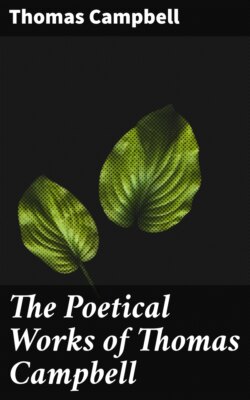Читать книгу The Poetical Works of Thomas Campbell - Thomas Campbell - Страница 5
На сайте Литреса книга снята с продажи.
ANALYSIS OF PART I.
ОглавлениеTable of Contents
The Poem opens with a comparison between the beauty of remote objects in a landscape, and those ideal scenes of felicity which the imagination delights to contemplate ... the influence of anticipation upon the other passions is next delineated ... an allusion is made to the well-known fiction in Pagan tradition, that, when all the guardian deities of mankind abandoned the world, Hope alone was left behind ... the consolations of this passion in situations of distress ... the seaman on his watch ... the soldier marching into battle ... allusion to the interesting adventures of Byron.
The inspiration of Hope, as it actuates the efforts of genius, whether in the department of science, or of taste ... domestic felicity, how intimately connected with views of future happiness ... picture of a mother watching her infant when asleep ... pictures of the prisoner, the maniac, and the wanderer.
From the consolations of individual misery, a transition is made to prospects of political improvement in the future state of society ... the wide field that is yet open for the progress of humanising arts among uncivilised nations ... from these views of amelioration of society, and the extension of liberty and truth over despotic and barbarous countries, by a melancholy contrast of ideas, we are led to reflect upon the hard fate of a brave people recently conspicuous in their struggles for independence[2] ... description of the capture of Warsaw, of the last contest of the oppressors and the oppressed, and the massacre of the Polish patriots at the bridge of Prague ... apostrophe to the self-interested enemies of human improvement ... the wrongs of Africa ... the barbarous policy of Europeans in India ... prophecy in the Hindoo mythology of the expected descent of the Deity to redress the miseries of their race, and to take vengeance on the violators of justice and mercy.
[2] The Poles. This Poem first appeared in 1799.
